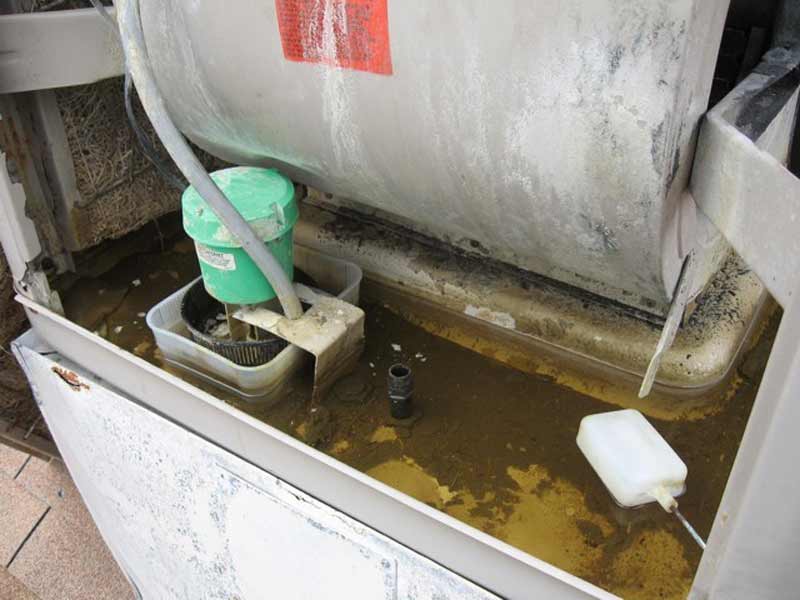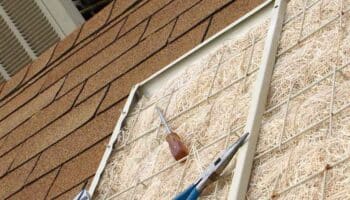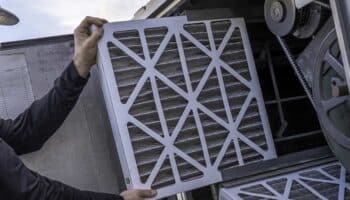We've independently reviewed this article to make sure it's as accurate as we can make it.
To find out more about our article creation and review process, check out our editorial guidelines.
A swamp cooler that cools is a wonderful thing, especially if you live in a hot arid region where you rely on it to keep your room or home comfortable.
A swamp cooler that cools but also smells bad can make the cooling experience pretty miserable, though.
Yes, it’s nice not to be hot but if the cool air stinks, or the swamp cooler itself gives off an odor that makes you want to dump it in a landfill somewhere, well, you’ve got to wonder at that point how bad being hot really is?
The thing to remember is as long as water’s involved, the potential for unpleasant odors will always be there. And with a swamp cooler, you can’t avoid water.
What you can avoid is unpleasant odors. Those unpleasant odors can also be very specific in their smell and give you an indication of where to target your smell-fighting efforts.
So, before you do decide to toss your swamp cooler, let’s take a look at what may be causing the reason for the bad smell and what you can do to prevent it.
1. Swamp Cooler Smells Like Rotten Eggs
If you’re detecting the scent of what can best be described as “rotten eggs,” then you could be dealing with two things.
Smelling rotten eggs could be a sign of a gas leak! Make sure that the smell is definitely coming from ONLY the swamp cooler, if you smell it anywhere else in your home – open up those windows and get ventilating.
Get a gas detector to check ASAP. If you do have a leak, you’ll need to call a contractor to investigate.
If the rotten egg smell is only coming from your electric swamp cooler, then that’s an annoying but much less dangerous problem.
This is usually the result of a plumbing leak or water intrusion. Yes, the smell is also associated with natural gas but in cases where water is involved, it’s usually due to water that was left standing for a while.
Standing or stagnating water that’s been allowed to sit too long will start to smell like rotten eggs due to the breakdown of bacteria within the water. This decomposition of organic material leads to the production of hydrogen sulfide, which is where the rotten egg smell comes from.
With swamp coolers, the most common reason for stagnate water is the result of a cooler that’s been left to sit for long periods of time without use or when it’s winterized and the tank isn’t properly drained.
To correct the smell, drain the tank or reservoir and clean properly with soap and water or vinegar and water. Make sure to get any visible mildew or other gunk as well. That’s probably the source of decomposition and smells.
To prevent it in the future, drain your swamp cooler completely if you know you’re not going to use it for a while. Also, clean it and allow to dry before closing it back up.
2. Swamp Cooler Smells Like Fish
If you smell a fishy odor coming from your swamp cooler, it could still be the result of stagnant water. If there wasn’t hydrogen sulfide present in the standing water but other types of bacteria or mildew, the result could be a fishy smell.
The other place you can usually find this smell is in the water pads. Again, like standing water, if the pads haven’t been changed in a while after considerable use, mildew and mold can start to take hold and emit that all too foul odor.
To correct the smell, replace the pads and clean your tank and water distribution system. To prevent fish smells in the future, change your water pads based on your manufacturer’s recommendations and clean your cooler as needed and before and after long term storage placement.
3. Your Supply Water
If you routinely clean your swamp cooler and change your pads as needed, and now suddenly find an odd odor coming from it, you may need to check the water source or if you smell the same odor in other locations around your home.
The reason to do this is to simply confirm whether it’s actually isolated to only your swamp cooler or if it may be an issue with the water itself. If it’s the water, you may smell the same odor from your sinks or bathtubs. Toilet reservoirs, too, since they hold standing water longer than other locations.
If it is your water, you should contact your water company or a plumber. It could be something in your plumbing, water, or well if you’re on well water. Also, it’s not uncommon to have odd water odors after storms or flooding. That’s why boil water orders are usually issued.
In any case, it’s time to consult outside assistance to ensure the issue is fixable and not a threat to your health.
4. Something Died
If your swamp cooler has a smell coming from it that makes you wonder if something died, the answer may very well be… something died.
Look, you have to remember, even if you don’t use your swamp cooler in the winter, that doesn’t mean other critters aren’t. It’s completely common to find pests trying to turn pretty much anything into a home, especially if it provides shelter from the cold and bad weather.
Everyone is used to hearing about or dealing with mice getting into sheds, garages, attics, or even homes. It’s not surprising to find a stray cat underneath the hood of your car when it’s extremely cold. Every once and a while, chimneys can become hideouts for squirrels or raccoons if they go unused for long periods of time.
The same is true for unused appliances. If they provide shelter and maybe some warmth, pests will try to find a way in. Swamp coolers are no different. And you may have to deal with a dead rodent or bird in yours once or twice.
That doesn’t mean a rodent will get into your swamp cooler and drown. A rodent doesn’t have to drown to die in your swamp cooler. However, ensuring your cooler is properly drained before extended periods of non-use may save a mouse’s life.
No, rodents can get killed by anything. Chewing on wires is a common way. But they can just as easily eat some poison and happen to die in your swamp cooler.
The main thing is, if you do smell something that is pretty foul, time to inspect your swamp cooler for any critters. If you find any that are deceased, dispose of them properly and clean as needed.
Speaking of cleaning…
5. Clean Your Unit Regularly and As Needed
This last point can’t be emphasized enough. The biggest key to keep your swamp cooler smelling okay is to clean it on a regular basis and if you spot a problem.
Besides cleaning the reservoir and changing the water pads, also clean any water tubing before and after prolonged use. Don’t just wipe the exterior surfaces. Get some pipe cleaners or narrow brushes and get down in those tubes and hoses.
This will prevent build up but also clear out any build-up that may already be in progress. Also, cleaning out your water tubes is a good way to make sure your water distribution remains efficient, which will ensure your cooling capability continues to meet your needs.
If you haven’t found any dead animals in your unit, it doesn’t mean animals haven’t been in there. Look for any kind of animal droppings and clean those out as well. You don’t want floating waste in your tank water, after all.
Lastly, make sure to take care of any mineral or corrosion build-up, too. They don’t always lead to bad smells but if you do catch a whiff of wet metal coming from your unit, it’s probably either mineral build-up or rust somewhere in your cooler.

Conclusion
A swamp cooler that smells bad isn’t something anyone typically enjoys. The good news is the majority of the smells can be take care of with minor fixes and prevented long term with some regular maintenance.
The rare times when you may have to call for technical help is when there’s a larger issue related to the water supply or plumbing system, not necessarily your swamp cooler alone.
That being said, if the source of the smell isn’t treated and taken care of, long term damage may occur when it can easily be avoided.







